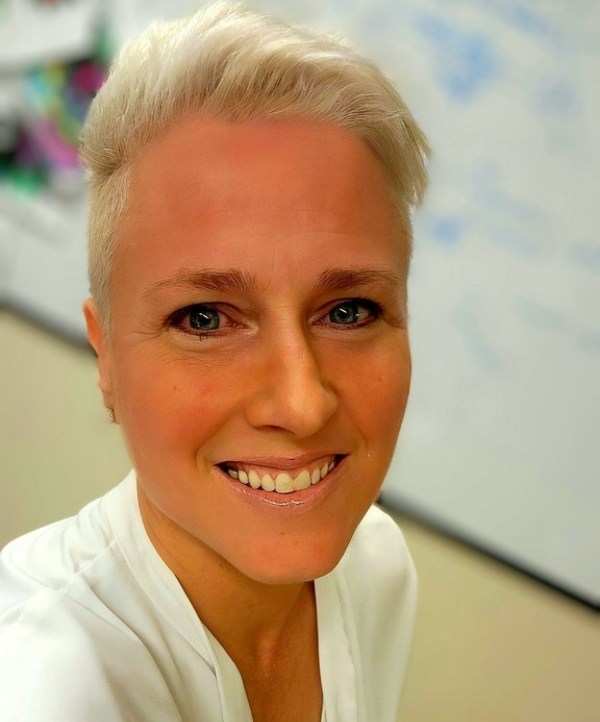
Building a new reality for in-patient care: how life experience and a policy education can create change
When Sherilynn Bray began nursing in 2012, it was quickly apparent to her that the many moving parts to caring for a patient can be chaotic.
By Scott Larson for JSGSSo in 2016 when the opportunity to be part of a pilot program to create Canada’s first Accountable Care Unit (ACU) at Pasqua Hospital in Regina, Bray jumped at the chance.
The ACU (now known as Collaborative Inpatient Care or CIC) model of care is a team-based approach to in-patient care that involves a team of health-care professionals working closely together with the patient and family.
“CIC is a model of care that has a physician and a nursing unit leader that co-leads the unit and is builts on four pillars: co-leadership, geographic alignment of teams on the unit (nurses doctors, pharmacists etc.), routines and relationships and metrics (tracking performance and outcomes),” says Bray, who is the Director, Site Lead for the Pasqua Hospital in Regina Saskatchewan. “It was an opportunity to meet stakeholders that wanted to change the chaos of what they were working in.”
The results of the ACU program were even better than they expected.
“It was transformative,” Bray says. “Patients saw their doctors, patients had the nursing teams talking to them; everything was close for the nurses so they were responsive. It allowed us to foster and develop this model of care that hopefully shows us different outcomes. We had some outcomes that were so notable that the province supported us and spread it to three different units at the Pasqua Hospital and to Saskatoon.”
Bray says it's been a great adventure and credits her Johnson Shoyama Graduate School’s Master of Health Administration program for preparing her to meet the challenges.
“Without the lessons I learned through Johnson Shoyama I wouldn’t have been as successful in engaging other stakeholders,” she says.
Bray had come to nursing a little later in life, going back to school in her 30s and graduating with a nursing degree in 2012.
“I recognized that my life experience really lends itself to becoming a nurse,” says Bray, who had previously worked as a care aid and pharmacy technologist while also experiencing the health-care system from a personal point of view.
Even as she began her nursing career working in the neonatal and then oncology wards, Bray knew she wanted to pursue more education.
“I am passionate about improving systems,” she says. “So I decided I wanted to do a masters, but not nursing. I wanted to do a systems or policy-type degree that would expand and accentuate my nursing horizon. And I also wanted to study and learn in the province where I was living.”
The Johnson Shoyama Graduate School (JSGS) had just begun its Master of Health Administration program which piqued Bray’s interest.
In 2013 she began her MHA, and was one of the first graduates in 2015.
“My relationship with the school has been pivotal and important to me,” she says. “The amount of prep that the program gave me to enter into a management position was really helpful.”
Working and studying with people from all different areas of the health profession gave her the opportunity to see health care from many viewpoints.
“I hadn’t expected to be going to school with pharmacists and social workers and doctors and nurses,” she says. “We had every kind of person, and I hadn’t thought of looking at a problem through that lens. I had no idea what a social worker did, I was just doing my part as a nurse, and they didn’t know what I did.”
Bray says being able to break down what part of the care each profession plays challenged her to look at issues on a much wider scale.
“So when I came to this work it was like, hold on a second, I have to remember we are a building block and we also have threads that are connected. So, if we make one change here, what is the fallout on the other side?
“I knew the lenses were different and I had to go in with a curious mind instead of coming in with the need to fix this problem from my end."
Bray says her time spent in the JSGS program is still paying dividends today.
“I have a great, deep appreciation and affection and passion for the school and the programs it offers,” she says. “They are really big systems thinkers and it is so fun to be working beside some of the people that I have gone to school with or who I have spoken with when I have come in contact with at residencies.”
The CIC model of care, has been so successful the province is workingoing to expand it to all inpatient medicine units in the province. Bray has been tasked to help support the provincial rollout for the next 3 months.
“I’m loving being back in this role,” she says. “I’m passionate about improving the system for patients, families and the people doing the work. No matter where I am, I hope I am part of the change and helping support the solutions, offer a new lens and provide different contexts, but also a promoter of the system."

